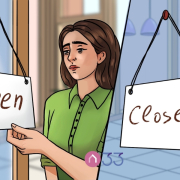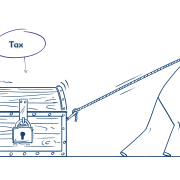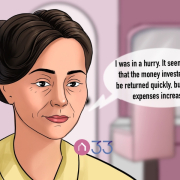Artsakh women initiate businesses and go through “hell’s twists and turns”
Coffee lovers will love Ada’s apartment. The smell of coffee has captivated it. Ada’s “Tesan-Tena” business is there. She started her business in Stepanakert in 2020 after the war. Initially, she sold aromatic coffees and teas online. A few months later, she opened her small shop.
If you’re in a hurry, read this.
Ada is not engaged in the usual sale of ground coffee or tea; the uniqueness of her business lies in beautiful packaging and lovely presentation. She makes and sells coffee and tea bouquets, boxes, and other packaging with her own hands. Throughout her career, Ada has not attended any business courses and has no textbook knowledge in this field; she acts according to her feelings, as she sees fit. She is an economist by profession, and before being forcibly displaced from Artsakh, she worked as a chief specialist in the treasury of the Artsakh Ministry of Finance.
After the 44-day war, the state in Artsakh established tax privileges for the business sector. As a business opened in the post-war period, “Tesan-Tenan” was exempt from all types of taxes. Before the blockade of Artsakh by Azerbaijan, the business worked smoothly, providing a stable income. Each subsequent month of the blockade brought with it new difficulties for business. And after the 10-month blockade, as a result of the armed attack of Azerbaijan, 120 thousand Armenians were forcibly displaced from Artsakh, moving to Armenia. Here, they were forced to accept new rules of the game.
“After the displacement, my clients asked to continue their business in Armenia. You know about the rents for the premises, they are expensive, very expensive, but we decided to open, resume business, open a store,” says Ada Sargsyan.
Hopes and expectations were not justified, rents and taxes were high, and income did not cover expenses. After 8 months of struggle, Ada closed the store, but she has no intention of closing the business. Before opening a store in Armenia, they had calculated all the costs, she says, but they didn’t choose the right place for the store; they had to move to the center of Yerevan, where they didn’t have the financial means. The store closed, but the regular customers continued to come. She says she has put a lot of effort and energy into this business, and she will continue, despite all the difficulties. “This business is a blessing for me.”
He did not use any privileges in Armenia to continue his favorite business; on the contrary, instead of 5%, he already pays 10% turnover tax, like everyone else. “The privilege is not exemption from taxes; the privilege will be for the state to help attract finance, for example, implement grant programs.”
No privileges, but there is an increase in taxes
In post-war Artsakh, businesses multiplied thanks to the state’s policies. Some businesses were exempt from taxes. This is what Sofia Hovsepyan, coordinator of the Artsakh Social Development Foundation, says. “People understood that they had to start something, do something, that they could not rely on the state, receive benefits, and live on it.”
However, in Armenia, not only are there no privileges, but the tax burden is also being tightened, applying to everyone without regard for the needs and capabilities of different businesses. For example, as of January 1, 2025, the turnover tax has been doubled.
“The law was passed to be equal for everyone, and in reality, this law will also crush local businesses, since no privileges or advantages are given to people to develop their business. This will force people to act secretly or simply close down and leave the country,” says Sofia Hovsepyan.
In her opinion, many Artsakh residents do not leave Armenia in the hope that they will still manage to do something here and will stay in their homeland, but if they cannot earn enough money and have a decent job, they will leave the country. “That would be a huge loss for the Republic of Armenia, and a closed door for the vision of returning to Artsakh.”
“It took a long time to prove that I can bake good bread, too.”
After being forcibly displaced from Artsakh, Karine worked for some time at the Public Radio in her profession as a sound director and editor. Then she went to Russia for a short time to work there. After returning, she was ashamed to go to the radio again for work, she could not stay idle, so she got a job in one of the supermarkets in Artashat.
And one day she saw an announcement on social networks about a grant business program for Artsakh residents. The Armenian Foundation for Sustainable Development was the implementer. She sent the application, wrote a business plan, and became one of the 15 winners.
Some of the necessary equipment for the bakery was purchased through grants, while the rest was funded by her own resources. Karine opened the “Ari Ojakh” bakery in Masis because in Artashat, where they live, the rental fees for commercial premises are higher. This means she spends time and money on the road.
“There are 4 such factories next to my workshop in Masis, they have more experience, they have been working for a long time. It took me quite a long time to get a customer. It took me a long time to prove that I also produce good bread and that people can buy it from me,” says Karine. The jewels of the business are the zhengyalov bread and baklava; people order it again after trying it once.
Her husband and 2 sisters help her. She says she doesn’t see her daughters’ faces, she is at the workshop from morning to night, she leaves at 5 in the morning and gets home at 8-9 in the evening.
Having state benefits, she says, will of course play a big role in the development of the business. “If the state helps with money for 6 months, I will manage to buy at least a refrigerator for cookies and cakes, it is very necessary, but I can’t afford it.”
Karine has big plans for this business; they plan to increase volumes and income.
Instead of giving the fish, it is better to give the hook
The Armenian business market is a new environment for the people of Artsakh, which they must first get acquainted with, then adapt to and be ready for changes. It is mandatory to be constantly informed and flexible, says business expert Hripsime Kocharyan.
“One-time support is important as a first aid, but then it would be better to implement educational programs and educate entrepreneurs, and organize some events. Instead of giving the fish, the state would do well to give the hook, and let the beneficiary catch the fish,” says Hripsime Kocharyan in an interview with us.
The state has no support programs for Artsakh entrepreneurs and does not have data on how many of the forcibly displaced Artsakh residents have started businesses
Is it known how many Artsakh residents have established businesses in Armenia after being forcibly displaced? We tried to find out from the Ministry of Justice. In response to our inquiry from the Ministry’s State Register of Legal Entities Agency, they informed us that from September 19, 2023, to March 24, 2025, 292 legal entities and 70 individual entrepreneurs were registered. However, these are general data, and there is no information on how many of these were registered by displaced Artsakh residents.
We asked the Ministry of Economy about the support programs implemented for those forcibly displaced from Artsakh. The response states that there are no separate programs. “…The Ministry of Economy of the Republic of Armenia does not implement separate support programs for citizens forcibly displaced from Nagorno-Karabakh; however, they can benefit from state support programs developed by the Ministry. We also inform you that the Ministry does not conduct separate registration of citizens forcibly displaced from Nagorno-Karabakh.” It is also noted that in some programs, there are certain privileges for Artsakh residents. However, the response mentioned only one program, the “Measures for Involving Workers in the Developing Industry” support program implemented in cooperation with the State Revenue Committee. According to the State Revenue Committee, as of January 22, 2025, 78 beneficiaries had applied to the program, 33 of whom were displaced from Artsakh.
“The state has the potential and should support”
Yes, there are many problems for Artsakh businessmen in the Armenian business market: high rents for the premises, recognition, attracting finance, enduring the tax burden, etc. Economist Hrant Mikaelyan says that the state should help these people temporarily taken under its protection to solve these problems.
In his opinion, the right direction would be for the state to provide low-rent areas to Artsakh residents to develop their business. “For example, a business center could be created, with office or perhaps commercial space, where the businesses of Artsakh residents would be located. This would also allow them to work together and solve the problem of adaptation,” the economist believes, considering this option of state support to be quite promising.
The economist also notes that the Republic of Armenia has the potential to ease its tax burden. “For example, we need to provide preferential loans so that they can start a business. Here, perhaps, the tax should not be 0%, but it should be, let’s say, half of the general rate.”
In addition to all these issues, there is another important issue: to ensure conditions for non-emigration from Armenia. “It is very important for Armenia to keep the people of Artsakh on the territory of Armenia and we should conduct policy with that assumption in mind. For example, if people stay or if the whole family stays, then more preferential interest rates on the loan should be provided.”
Author: Aspram Avanesyan
The material was prepared within the framework of the “Support to Women Entrepreneurs” program by the “Point 33” NGO with the support of the Embassy of the Kingdom of the Netherlands in Armenia. The author is solely responsible for the content of the material, and the views expressed in it may not coincide with the views of the Embassy.








